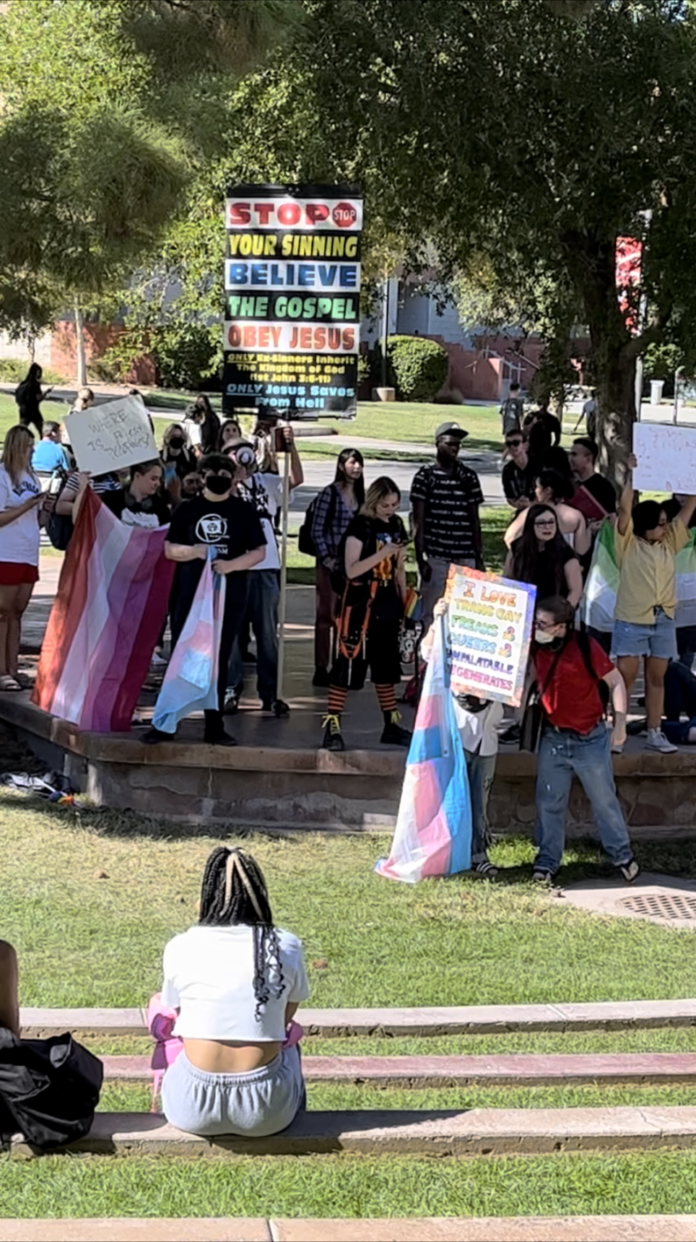People preaching religion at UNLV is not anything out of the ordinary. Anyone is welcome to share their thoughts with the students on campus, whether it be a guest or student organization. Although allowed, many students are not so welcoming to the guests who are disruptive and disrespectful.
The UNLV Policies website on speech and advocacy reads: “On University grounds open to the public generally, all persons may exercise the constitutionally protected rights of free expression, speech, and assembly.”
Students have a lot of different perspectives on how this affects them and campus life. Melanie Rodriguez said, “I think it’s sweet. [It’s their] freedom of speech and religion. [It] shows that they aren’t ashamed of what they believe in. They’re not forcing anyone to believe, [and] sometimes it’s nice to listen.”
Rodriguez and other students understand that while on campus, the university safeguards activists’ freedom of speech rights. However, some students feel like said activism can be a nuisance after a while.
Teddy Nguyen believes that the activists’ use of megaphones, speakers, and microphones distracts students who are studying and said, “It’s disruptive. You can hear them from inside the buildings often.” He enjoys studying on the balcony on the fourth floor of the hospitality building and said that even the students from that altitude and distance can hear the guests who are preaching with megaphones.
This raises the question, should students report these disruptions? UNLV’s outdoor noise policy highlights that guests, students, and student organizations may only use amplified sound with the prior written permission of the university in designated areas, and said sound cannot interfere with any teaching and learning that is happening on campus.
Though guests have the right to express their views, they still need to oblige to the guidelines provided by the university when doing so on campus. If at any point a student feels that the use of amplified sound used by the activist is disruptive or if they are breaking guidelines, they should report this and have the university take appropriate action to ensure the university’s learning environment is maintained.
Students also feel that the guests who come onto campus to preach often do it in ways that are disrespectful to them and other religions. Frida Reynoso said, “People don’t enjoy being verbally attacked by strangers telling them they’re on the wrong path [in life].”
She elaborated on this statement by explaining that the guests tell students that “They are going to hell!” and are told what is sinful and what is not. Students feel they are trying to impose on the freedoms of others with their beliefs of righteousness.
Students who identify with other religions may also feel pressured, targeted, and invalidated by the people who come onto campus preaching religion. This is the reality of Eman Yonis, a UNLV student who practices Islam.
“As a Hijabi woman I’ve had many people single me out when I’m running to a meeting or lecture and shove books and pamphlets into my hands,” said Yonis. “It’s patronizing as it feels like they’re saying ‘Your religion is fake and you need saving,’ without actually saying it and without me even initiating a conversation.”Anyone can come to campus to share their beliefs on religion, however, that does not mean that every student needs to listen or change their beliefs. It is also important for students to remember that they can report guest speakers if they feel that they are breaking the “Time, Place, and Manner” restrictions that are set and enforced by UNLV.

